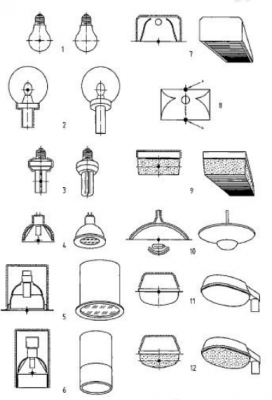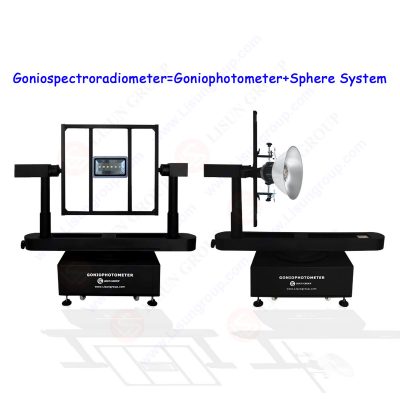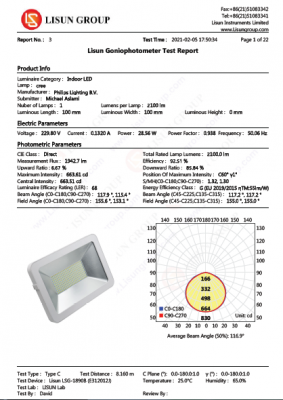The photometric center of a lamp or luminaire is the reference point, from which the photometric distance law is applicable. This appendix lists two methods to determine the photometric center as EN and CIE standard.
Picture below s quoted from EN 13032-1:2004 (Measurement and presentation of photometric data of lamps and luminaires—Part 1: Measurement and file format).

Photometric center of a luminaire
1. Incandescence lamp
2. With a clear cover
3. Compact fluorescence lamp
4. Reflector lamp
5. Luminaire with reflecting mirror
6. Luminaire with shield, substantially black
7. Luminaire with opaque sides
8. Direct-indirect luminaire a) Luminant area 1 with photometric centre 1 b) Luminant area 2 with photometric centre 2
9. Luminaire with diffusing/prismatic sides
10. Indirect luminaire with secondary reflector
11. Outdoor luminaire with clear cover
12. Outdoor luminaire with diffusing/prismatic cover
Picture below is quoted from CIE 121-1996 (The Photometry and Goniophotometry of Luminaires).

Photometric center of lamps
a) Tungsten-filament lamps, clear or lightly diffusing bulb:
The center of the solid figure bounded in outline by the filament
b) Lamps with diffusing or fluorescent bulb
The center of the diffusing porting of the lamp envelope
Note: This category includes straight fluorescence lamp and tubular discharge lamps with diffusing or colour-correcting envelopes.
c) Discharge lamps with curved-arc
The center of gravity of the plane figures formes in outline by the centre line of the arc discharge.
Note: This category includes U-limb sodium lamps and circular and curved fluorescence lamps.
d) Lamps source with built-in reflector
The center of gravity of plane figure formed in outline by the main opening of the reflector.
a) Luminaires with substantially opaque sides At the center of the main luminaire opening (or of any diffusing or prismatic material fitted across the opening) if the lamp compartment is substantially white or luminous, but at the light centre of the lamp if this is outside the plane of the luminaire opening or if the lamp compartment is substantially black or non-luminous and there is no diffusing or prismatic material across the opening.
b) Luminaires with diffusing/prismaic sides At the center of the solid figure bounded in outline by the luminous surfaces, but at the light centre of the lamp if it is outside this solid figure. c)Luminaires with transparent side or without side At the light center of the lamp.
Note: For a luminaire with two or more lamps (of approximately equal light output), the photometric center is the geometry center of the individual light centres of the lamps.
LSG-1890BCCD/LSG-1800ACCD goniospectroradiometer is high precision automatic goniophotometric instrument for luminous intensity distribution measurement with facility for rotating the light source. The LSG-1890BCCD/LSG-1800ACCD can do the spatial CCT test and the intensity distribution test. It is for industrial laboratory photometric data measurement of luminaires such as LED luminaires, LED Plant Lighting, HID luminaires, fluorescent lamps and so on.

LSG-1890BCCD High Precision Goniospectroradiometer
Standard:
Full meet the EN13032-1 clause 6.1.1.3 goniophotometer type 1, COMMISSION DELEGATED REGULATION (EU) 2019/2015, CIE-70, CIE-121, IES LM-79, IES LM-75, IES LM-80 and ect.
Measurement:
Luminous Intensity Data, Luminous Intensity Distribution, Zonal Luminous Flux, Luminaries Efficiency, Luminance Distribution, Coefficient Of Utilization, Luminance Limitation Curves Glare, Maximum Ratio of Distance to Height, Equal Illuminance Diagrams, Curves of Luminaires VS Lighting Area, Isocandela Diagrams, Efficient Luminescence Angle, EEI, UGR, CCT, CRI, Color Temperature Distribution, Spectrum, (x, y)/(u, v), PAR, PPF, PPFD 3D distribution test and etc.
Specification:
• LSG-1890BCCD/LSG-1800ACCD Goniospectroradiometer=LSG-1890B/LSG-1800A Goniophotometer System + LPCE-2 Integrating sphere Spectroradiometer System
• The goniophotometer can do the B-β test with two pillars and the C-γ test with single pillar & multi-function jigs
• Test Max Luminaires size and weight: LSG-1890BCCD is 2000mm/60kg and LSG-1800ACCD is 1600mm/50kg
• The tested luminaries rotates around an angle of (γ)±180°(or 0-360°) and the tested luminaries rotates around itself with an angle of (C)±180°(or 0-360°)
• Luminosity Testing Range: Illuminance 0.01lx~99,999lx; Light Intensity 1.0cd~10^7cd (detector)
• Angle accuracy: LSG-1890BCCD is 0.1°, LSG-1800ACCD is 0.2°
• Work with high accuracy and quick CCD Spectroradiometer to measure spatial color parameters
• Accuracy of chromaticity coordinate: ±0.0015 or ±0.0005(under standard A lamp)
• Spectral Range Wavelength: 350nm ~800nm; Accuracy of wavelength: ±0.5nm
• The Hardware and Software can do the PAR, PPF and PPFD 3D distribution test, which can export IES/LDT files
• Photometry Accuracy: CIE Class A (Class L is option)
• Testing Accuracy: 2%(Under Standard lamp); Stray Light: less than 0.1%
• English version software can run in Win7, Win8 or Win10, Win11
• LISUN goniophotometer software can export CIE, IES, LDT and other format files. These kinds of format files can be transferred by other illumination and luminaire design software such as DiaLux

LSG-1890BCCD Test Report
Goniophotometer is a device used to measure the light distribution performance of lamps. Goniophotometer measures the spatial light intensity distribution of lamps or light sources, total luminous flux and lamp efficiency and other parameters.
Goniophotometer need to work in larger darkroom. Use low-reflectivity materials in the room to avoid reflected light from entering the probe. Depending on the arrangement of the measuring light path, two measurement schemes can be used to measure the luminous flux: the illuminance integral method and the luminous intensity integral method.
Goniophotometer test system. It is mainly divided into two types: horizontal and vertical. It is mainly used to test the lumens, light distribution curve, glare level, and iso-illuminance distribution of the whole lamp. In addition, one of the most important functions is to export IES or LDT files. (Goniophotometer system can also add a spectrometer and a color probe to form a system for spatial spectral distribution testing.) LISUN goniophotometers both for horizontal and vertical model are completely meets LM-79-19, IES LM-80-08. You can check the operate vedio below:

Lisun Instruments Limited was found by LISUN GROUP in 2003. LISUN quality system has been strictly certified by ISO9001:2015. As a CIE Membership, LISUN products are designed based on CIE, IEC and other international or national standards. All products passed CE certificate and authenticated by the third party lab.
Our main products are Goniophotometer, Integrating Sphere, Spectroradiometer, Surge Generator, ESD Simulator Guns, EMI Receiver, EMC Test Equipment, Electrical Safety Tester, Environmental Chamber, Temperature Chamber, Climate Chamber, Thermal Chamber, Salt Spray Test, Dust Test Chamber, Waterproof Test, RoHS Test (EDXRF), Glow Wire Test and Needle Flame Test.
Please feel free to contact us if you need any support.
Tech Dep: Service@Lisungroup.com, Cell/WhatsApp:+8615317907381
Sales Dep: Sales@Lisungroup.com, Cell/WhatsApp:+8618117273997
Your email address will not be published. Required fields are marked *